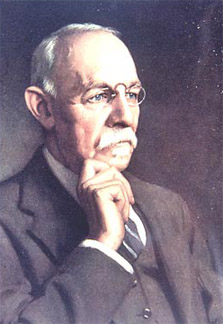The University of Iowa History of Medicine Society invites you to hear:

Nicholas P. Rossi, Emeritus Professor, Department of Cardiothoracic Surgery, University of Iowa College of Medicine. Rossi will provide a fascinating look at the life and medical achievements of William Stewart Halsted, considered the father of modern American surgery.
Halsted, who lived from 1852-1922, was one of the “Big Four” professors who founded John Hopkins Hospital. Halsted was an early pioneer for anesthesia and for aseptic technique in surgery, including the use of rubber gloves. Halsted also led a fascinating personal life: he was addicted to cocaine and morphine (which were not illegal during his lifetime) and was considered eccentric by his students. Throughout his lifetime, he was responsible for several innovations and advances in his field, including:
- Halsted’s law, which states that transplanted tissue will grow only if the host lacks that tissue
- Halsted mosquito forceps, a type of hemostat
- Halsted’s operation I, a procedure for inguinal hernia
- Halsted’s operation II, radical mastectomy for breast cancer
- Halsted’s sign, used to detect breast cancer
- Halsted’s suture, a mattress suture for wounds which minimized scarring
Attend this lecture to learn how the major preceding events of Halsted’s time and character ushered in one of the great eras of modern medicine.

This event will be held on Thursday, February 27 from 5:30-6:30 pm in Room 401 at Hardin Library for the Health Sciences. Find out more here or contact the Rare Book Room with questions at 335-9154 or by emailing donna-hirst@uiowa.edu. Want to know more about this fascinating figure? Read about Halsted at Hopkins Medicine or see his documentary.